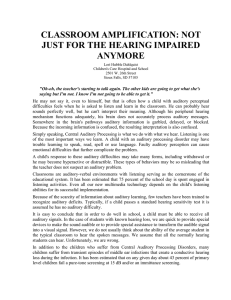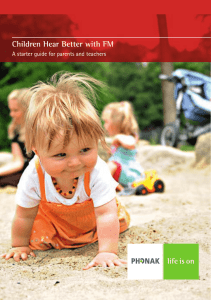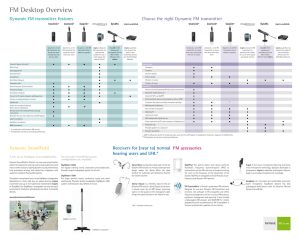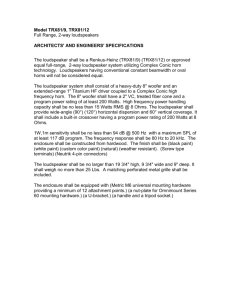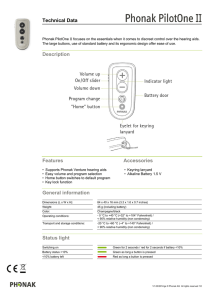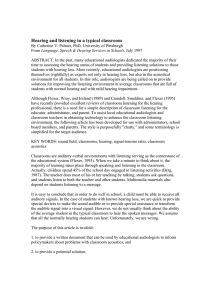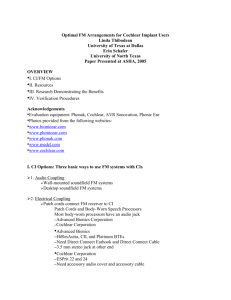A new era in classroom amplification
advertisement
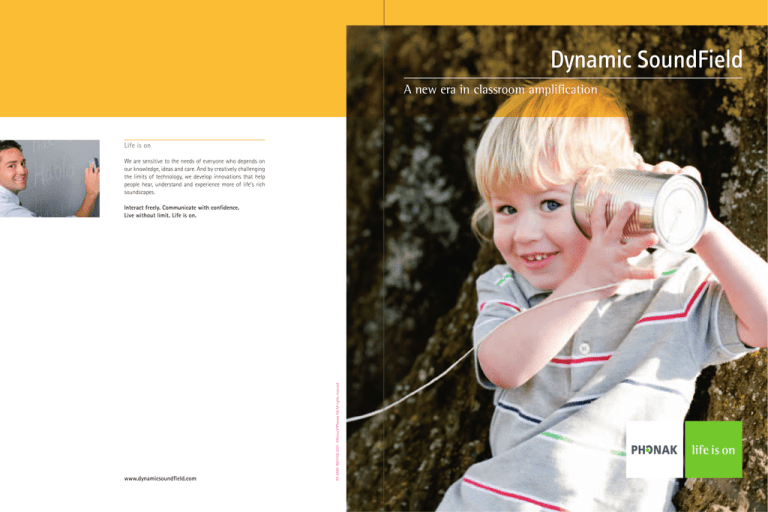
A new era in classroom amplification Life is on We are sensitive to the needs of everyone who depends on our knowledge, ideas and care. And by creatively challenging the limits of technology, we develop innovations that help people hear, understand and experience more of life’s rich soundscapes. www.dynamicsoundfield.com XX-XXXX-XX/V1.00 2011 –XX/visu’l/©Phonak AG All rights reserved Interact freely. Communicate with confidence. Live without limit. Life is on. 2 3 Proven soundfield benefits* Why soundfield matters For the best possible learning experience students must be able to hear the teacher or lecturer clearly in class. Unfortunately this is not always possible. Factors such as background noise, the distance between teacher and students, and challenging room acoustics can make understanding the speaker difficult, even for students with normal hearing. For teachers meanwhile, noisy classrooms and lecture halls mean raising the voice to be heard, which in turn often leads to vocal strain, hoarseness and in the case of temporary voice loss, even time off work. These are the reasons soundfield technology was born; to clearly amplify the teacher’s voice and, in doing so, help students to hear and understand directions more easily. This approach has been scientifically proven to improve student performance and the vocal health of the teacher, meaning less teacher sick days as a result. Numerous scientific publications have documented the many benefits that soundfield amplification brings. The most important of these include: Students’ listening and learning skills improve Less speaker repetition required Enhanced class instruction and management Less teacher vocal strain * The MARRS Project: Mainstream Amplification Resource Room Study – http://www.classroomhearing.org/research/marrsStudy.html Who is Phonak? Teachers often suffer from vocal health problems. Dynamic SoundField vastly reduces such issues. Headquartered near Zurich, Switzerland, Phonak is a member of the Sonova Group and has over 60 years of experience in developing and distributing state-of-the-art hearing systems and wireless devices. Its combination of hearing technology experience, acoustical expertise and strong cooperation with hearing care professionals around the world allows Phonak to significantly improve people’s hearing abilities and speech understanding, and therefore their quality of life. 4 5 Soundfield: the story so far Despite soundfield’s proven benefits, the story of this technology has not always been a happy one, as there are very real issues associated with traditional soundfield systems. These range from in-class echoes and feedback to overly complex settings and incompatibility with the wireless ‘FM’ hearing systems worn by many hearing-impaired students. This imperfect situation even led The Acoustical Society of America, in its position statement on sound amplification in the classroom*, to state that sound amplification “increases Today’s soundfield issues rather than reduces overall classroom sound levels”, and that “improperly maintained microphones and loudspeakers or poor user skills can cause even poorer speech communication than no amplification systems”. Unwanted noise Many classrooms, lecture halls and auditoriums create lots of reverberation, meaning amplified sounds bounce off hard surfaces and produce problematic noise. * http://asa.aip.org/amplification.pdf Feedback Existing soundfield systems often create screeching feedback when the microphone gets too close to the loudspeaker. This leads to a speaker’s mobility being reduced, which limits teachers, or requires the loudspeaker’s volume to be turned down, in turn limiting student comprehension. Configuration confusion Many of today’s existing soundfield systems feature adjustable frequency settings and separate volume controls. Who ‘sets’ these sliders? Does a qualified technician need calling each time settings are accidentally changed? Patchwork complexity If there are FM-wearing hearing-impaired students in class, someone must ‘patch’ together a system that enables both FM and normal-hearing soundfield listeners to hear the teacher’s words. This often results in the FM system’s voice signal being degraded, meaning hearing-impaired students struggle even more. 6 7 The Dynamic SoundField difference Phonak’s engineers and audiologists designed our Dynamic SoundField system to address each of today’s soundfield issues. Comprising one or two DigiMaster loudspeakers and an inspiro transmitter, this digital system helps students hear and understand presentations more easily than ever before, while teachers, lecturers, professors and technical staff love its portability and ease of use. Fully automated settings With Dynamic SoundField there is no need for teachers or technical staff to monitor and adjust frequency settings and volume levels. Instead the system automatically measures the room’s noise level and optimizes its own configuration, ensuring speech remains loud and clear by finding the best balance between the speaker’s speech signal and the room's background noise. You just plug in, turn on and teach. Unique “line source” loudspeaker unit Phonak’s DigiMaster loudspeaker array offers high directionality and creates far less problematic reverberation than any existing soundfield system. The DigiMaster transmits a clean, high quality signal using just one or two loudspeakers per class (depending on room size, see page 8 and 9). Digital sound quality Dynamic SoundField digitally transmits its signals, automatically changing frequencies when required in order to eliminate potential interference caused by a building’s existing WiFi and Bluetooth networks. The system does not need to operate on a particular channel, there are no sound ‘dead spots’, pairing transmitter and loudspeaker is simple, and there is no limit to the number of license-free systems that can be used on one site. Reassuringly future-ready Dynamic SoundField is 100 % future-proof as both its inspiro transmitter microphone and DigiMaster loudspeaker unit feature USB connectors for downloading free internet updates. Research has shown that when using Dynamic SoundField by Phonak, the overall noise in the classroom is reduced. The perfect choice for Normal and large classrooms Lecture halls Small auditoriums Small gymnasiums inspiro transmitter DigiMaster loudspeaker 8 9 System options For normal classrooms For regular-sized classrooms, Phonak’s DigiMaster 5000 system fits the bill perfectly. Featuring one portable DigiMaster loudspeaker (available with floor stand or wall mount) and a wearable inspiro speaker transmitter, this system offers the ultimate in instant sound performance. Loudspeakers: 1 DigiMaster 5000 Transmitters: minimum 1 inspiro (up to 9 additional inspiro, DynaMic and/or inspiro audioHub transmitters possible) Microphones: choose EasyBoom or iLapel Room size: 100 m (1076 ft ) and more 2 2 Recommended configuration for regular sized classrooms For larger rooms For larger classrooms, lecture halls and auditoriums, Phonak’s DigiMaster 7000 is the Dynamic SoundField system of choice. Its two loudspeakers can distribute sound over more than double the area of one DigiMaster 5000. DigiMaster 7000 loudspeakers can also be wall mounted or supplied with floor stands. Recommended configuration for square classrooms Choosing your microphone Q&A session? No problem... Two microphones are available for the primary speaker to use with their inspiro transmitter: the head-worn EasyBoom and shirt-worn iLapel. For the best sound performance, choose EasyBoom. For increased simplicity and flexibility, choose iLapel. Do you want to amplify questions from the audience through the DigiMaster loudspeaker? Then simply use DynaMic, Phonak’s handy passaround microphone. This works seamlessly with Dynamic SoundField over inspiro’s built-in Multi Talker Network. Up to ten speaker transmitters in total (inspiro, DynaMic and/or inspiro audioHub) can be used with every Dynamic SoundField system. iLapel microphone EasyBoom microphone Loudspeakers: 2 DigiMaster 7000 Transmitters: minimum 1 inspiro (up to 9 additional inspiro, DynaMic and/or inspiro audioHub transmitters possible) Microphones: choose EasyBoom or iLapel Room size: 300 m 2 (3230 ft 2) and more Recommended configuration for long classrooms DynaMic microphone 10 11 Compatible with interactive whiteboards and more If you already use interactive whiteboards and screens in classrooms or lecture halls then you’ll know all about the excellent visual benefits and interactivity these can bring. Now just add Dynamic SoundField to the mix for equally revolutionary sound performance. Simply connect a whiteboard-connected computer or other interactive screen to the DigiMaster using a standard audio cable. The result is a high-performance system that intelligently amplifies its audio output to ensure students hear and understand everything the speaker says. inspiro transmitter DigiMaster loudspeaker Connect more media If you plan to use additional multimedia devices during your presentation such as TVs, laptops and tablets, simply connect these to the optional inspiro audioHub. This hub connects wirelessly to your DigiMaster loudspeaker(s) using Phonak’s MultiTalker Network. The result? Sound from whichever multimedia source you choose is automatically heard through your DigiMaster loudspeaker(s) for improved sound quality and optimized speech sounds. inspiro audioHub transmitter DigiMaster loudspeaker inspiro transmitter 13 Dynamic SoundField for every listener In schools and colleges around the world three trends are increasingly emerging: Simply choose the inspiro transmitter and mode that best suits your listeners: Hearing-impaired students are being integrated into mainstream education Greater numbers of hearing-impaired students are using wireless ‘FM’ hearing systems Schools and colleges are increasingly adopting soundfield technology for normal-hearing students Do all your students have normal hearing? Use Dynamic SoundField with a cost-effective inspiro SoundField transmitter Do all your students wear personal FM systems? Choose the inspiro Premium transmitter Do you have both normal hearing and hearing-impaired students in class? Use inspiro Premium in ‘FM + SoundField’ mode The result? A technical challenge that until now has remained unsolved: how to effectively combine soundfield and FM signals. Dynamic SoundField overcomes previous patchwork headaches by using one Dynamic transmitter to transmit both FM and soundfield signals. This is possible because Phonak’s advanced inspiro Premium transmitter features FM and soundfield signal processing and amplification algorithms within the same durable housing. With Dynamic SoundField you can expect students' listening and learning skills to improve. Never before has transmitting speech to a group of varied hearing students been so simple and so effective. 14 15 Related resources Here you will find a selection of helpful online movies and resources to further your soundfield education. If you have an iPhone or equivalent net-connected smartphone, just use a barcode app to scan or shoot the square images. Dynamic SoundField Online (includes ‘How To’ movies) What Users Say www.dynamicsoundfield.com http://bit.ly/DSFUsers Dynamic SoundField Movie Phonak On YouTube http://bit.ly/soundfield www.youtube.com/PhonakFM Chris Sarah Kristin Martha
